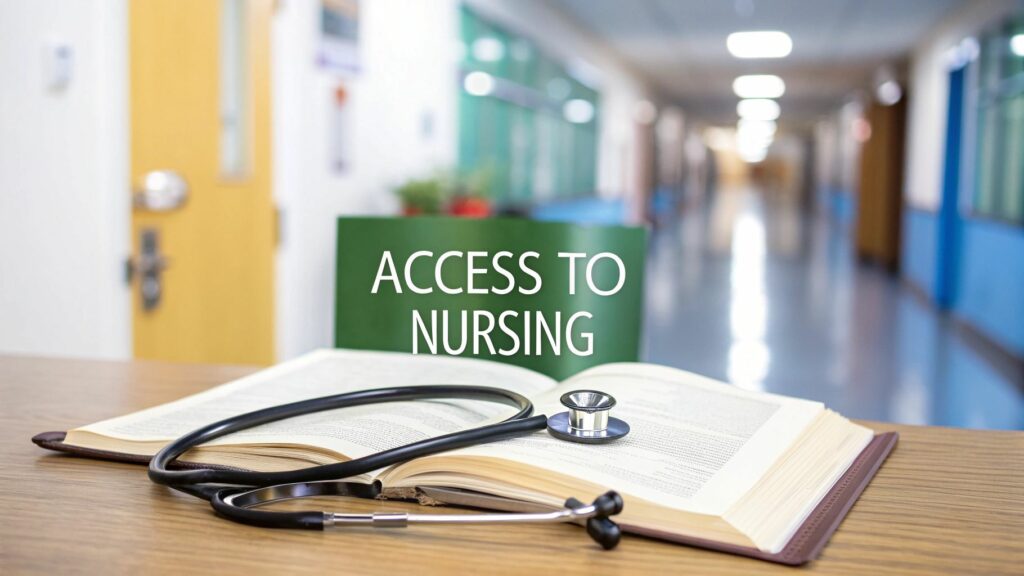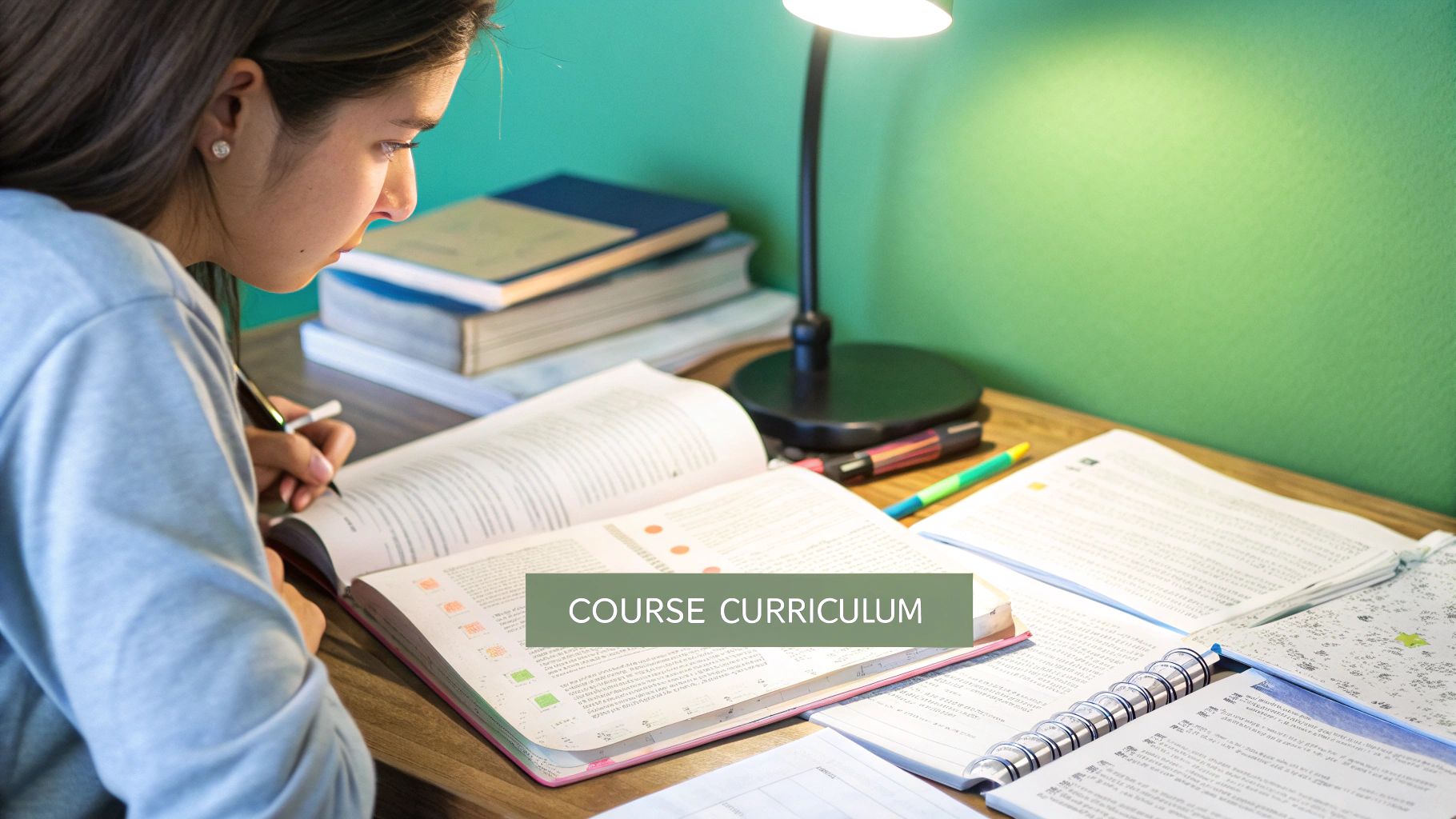
Have you ever wondered what it’s really like to be a learning disability nurse? Forget the stereotypes, this is a role that demands incredible skill, deep empathy, and a fierce commitment to helping people live their best lives. It's a career filled with unique challenges, but the rewards are truly profound.
If you’re considering this path, you’re likely driven by a desire to make a real, tangible difference. But what does a typical day actually involve? Let's walk through a shift to give you a realistic glimpse into this demanding but deeply fulfilling profession.
A Glimpse into the World of Learning Disability Nursing
Being a learning disability nurse isn't just a job; it's a partnership. Your core purpose is to support individuals with learning disabilities, helping them navigate health challenges, maintain their wellbeing, and live as independently as possible. This requires a unique blend of clinical expertise, creative problem-solving, and exceptional communication skills.
This is a career where no two days are ever the same. One moment you might be helping someone manage a long-term health condition like epilepsy, and the next you could be working with their family to create a new communication plan. It's dynamic, person-centred care at its very best.
What Does a Typical Day Look Like?
Imagine starting your shift at a residential care home. Your day isn't just a list of clinical tasks; it’s about connecting with the people you support and empowering them.
Here’s a snapshot of what your day might include:
-
Morning Handovers and Health Checks: Your day begins with a team briefing to get updates on each resident. You then start your rounds, but it's more than just checking vitals. It’s about having a chat with David about his favourite TV show while you help him with his morning medication, or using a picture-based chart to help Sarah explain how she’s feeling. You're constantly adapting your communication style to meet individual needs.
-
Mid-day Appointments and Advocacy: Later, you might accompany Michael to a GP appointment. He gets anxious in clinical settings, so your role is crucial. You help him prepare by going through a social story about the visit, and at the surgery, you act as his advocate. You ensure the doctor understands Michael’s needs and that Michael understands the doctor's advice, translating medical jargon into clear, simple language. This is where your advocacy skills truly shine.
-
Afternoon Care Planning and Collaboration: The afternoon could be spent in a multi-disciplinary meeting with social workers, therapists, and family members to review a resident's care plan. You provide vital nursing insights, ensuring their health needs are at the heart of the plan. You champion their rights and choices, making sure their voice is heard, even if they communicate non-verbally.
-
Evening Support and Skill Building: As the day winds down, you might support a small group in a cooking session, helping them develop life skills and build confidence. It’s a chance to observe, encourage, and provide support in a relaxed, normalised environment. You end your shift by carefully documenting the day's events, ensuring a seamless handover for the night staff.
This is just one example. You could be working in a community hub, a school, or a specialist NHS unit. But the core principles remain the same: you are an enabler, an advocate, and a highly skilled healthcare professional. It is challenging work that requires immense patience and resilience, but seeing someone achieve a goal they’ve worked hard for makes every difficult moment worthwhile.
Your Pathway to Becoming a Learning Disability Nurse
Does this sound like the career you've been searching for? If so, your journey starts with the right qualifications. To become a registered learning disability nurse, you need to complete a university degree in that specialism. But if you don't have traditional A-Levels, don't worry—the door to university is wide open.
An access course for nursing is the most direct and respected route for adults returning to education. It’s a qualification designed specifically to prepare you for the academic demands of a nursing degree, giving you the knowledge and UCAS points you need to apply.
Why an Online Access Course is a Game-Changer
For many aspiring nurses, fitting a traditional college course around work, family, and other commitments just isn't realistic. This is where online learning completely changes the game.
Studying from home gives you the freedom to create a schedule that works for you. You can study in the evenings after the kids are in bed, on your days off, or whenever you can find a spare hour. This flexibility removes one of the biggest barriers to education, allowing you to pursue your dream without putting your life on hold.
Online learning puts you in control. It's a modern, practical solution that trusts you to manage your own time while providing all the support you need to succeed.
With an online provider like Stonebridge College, you're not just left to figure things out on your own. You get dedicated support from qualified tutors who are there to guide you through every module. It’s a structured and supportive environment designed for adult learners.

Flexible Study, Flexible Payments
We know that finances are another major concern when returning to study. That’s why Stonebridge College offers a refreshingly different approach. Instead of asking for large upfront fees or locking you into a long-term loan, we provide a flexible subscription model.
Here’s how it benefits you:
-
Affordable Monthly Payments: You can spread the cost of your course into manageable monthly amounts, making it much easier to budget.
-
No Long-Term Commitment: You have the freedom to pause or cancel your subscription at any time. If your circumstances change, you’re not trapped in a credit agreement.
-
Total Control: This approach removes the financial pressure, so you can focus on what really matters—your studies.
By choosing Stonebridge College’s Access to Higher Education Diploma (Nursing), you are choosing a pathway that respects both your time and your budget. It’s a smart, flexible way to gain a nationally recognised qualification that will open the door to university and your future career as a learning disability nurse.
Your Questions Answered
Taking the first step towards a new career can feel daunting. To help you feel confident, here are answers to some of the most common questions about starting your journey.

How long will the access course take?
One of the biggest advantages of studying online is the flexibility. While most students complete the Access to Higher Education Diploma (Nursing) in around 9-12 months, you set the pace. If you have more time to dedicate, you could finish sooner. The course is designed to fit around your life, not the other way around.
Are online access courses accepted by universities?
Yes, absolutely. The Access to HE Diploma is a nationally recognised qualification that is widely accepted by universities across the UK for entry onto nursing degree programmes. It is specifically designed as an alternative to A-Levels for adult learners. For deeper insights, check out our guide on whether an Access to HE Diploma can lead to a nursing degree.
What if I don't have my GCSEs?
This is a common question, and it's not a deal-breaker. Universities require you to have GCSEs in English and Maths at grade C/4 or above (or an equivalent qualification). If you don't have them, you can study for them alongside your access course. Many online providers offer Functional Skills courses, which are accepted by universities as GCSE equivalents.
How do I prepare a strong university application?
Your access course will give you the academic skills and UCAS points you need, but your personal statement is where you truly shine. This is your opportunity to share your passion for learning disability nursing and connect your life experiences to the core values of the profession. For expert advice, read our tips on how to make your nursing application stand out and get familiar with the best practices for nursing school applications.
A career as a learning disability nurse is more than just a job—it’s a chance to empower people, champion their rights, and make a lasting impact every single day. If you’re ready to take the first step, we’re here to help you get there.
Explore our flexible Access to Higher Education Diploma (Nursing) at Stonebridge Associated Colleges and discover how our online subscription model can help you achieve your dream without putting your life on hold.




